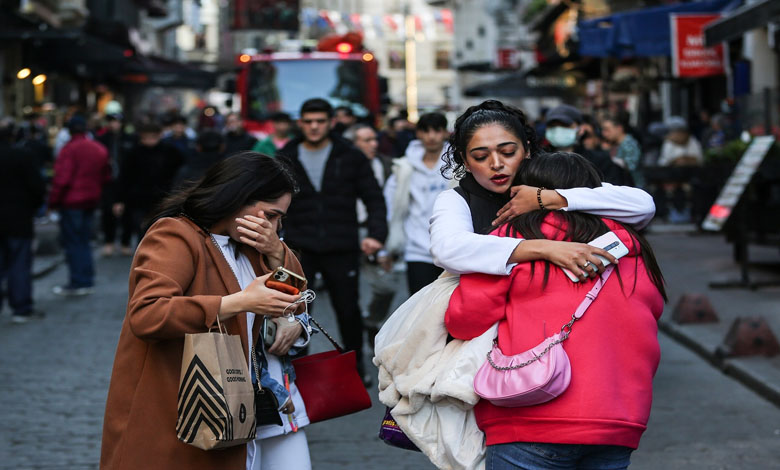Turkey.. Fears of the impact of the Istanbul bombing on tourist activities

Turkey has rejected the condolences of the United States following the Istanbul bombing. Turkish Interior Minister Suleyman Soylu said: “Turkey does not accept the condolences of the American embassy after the most deadly bombing in the country in more than five years, which killed six people and injured 81 others after a bag containing a quantity of TNT exploded in a crowded street”.
Shortly after the blast in the shopping district, Turkish President Recep Tayyip Erdogan said that the bombing was a deliberate attack, vowing to find and punish the perpetrators. Before leaving for the G20 summit in Indonesia, Erdogan told the media: “Efforts to force Turkey and the Turkish nation to surrender through terror will not reach their goal today as they have not done in the past.”
Terrorism in Turkey
The bombing took place during the peak hours of Istiqlal Street activity. The commercial street was more crowded than usual because a football match involving one of Turkey’s main teams was scheduled to take place later that evening at a nearby location. Business owners and residents along Istiqlal Street feared that the bombardment would have devastating and long-term effects.
Istiqlal Street and its surrounding area have been devastated in the past few years because the coronavirus pandemic and the accompanying travel ban have halted almost all tourism. Although the tourism industry in Istanbul has rebounded with the lifting of travel restrictions and the relatively weak Turkish lira has made Turkey’s visit cheaper, the continued threat of future violence in major commercial areas could again jeopardize the economic well-being of the community, beyond obvious safety concerns, reports The American conversation.
Kurdish exile
Turkish Interior Minister Süleyman Soylu declared that one of the female detainees was the suspected suicide bomber. Soylu declared, “We must reassure our people that the perpetrators of the incident that took place on Independence Street will be punished as they deserve.” He added that “the relevant units in our state continue to work to identify the perpetrators of this treacherous attack and the groups behind it.” Since then, Ahlam al-Bashir, a Syrian woman who claims to have received orders from the Syrian Democratic Union Party (PYD), has been identified, as authorities claim that al-Bashir illegally entered Turkey from northern Syria after receiving instructions on how to carry out the attack in the Kurdish city of Kobane.
The Turkish government considers the Democratic Union Party (PYD) to be a Syrian offshoot of the Kurdistan Workers’ Party (PKK), the main warring group fighting the Turkish government in the more than 40-year conflict between Turkey and the Kurdish rebels. The PKK denied any involvement in the attack. The PKK said in a statement published on the group’s website on Monday, “There is no question in refusing to target civilians in any way”. “The United States strongly condemns today’s violence in Istanbul, Turkey. Our hearts go out to those who have been injured and our deepest condolences go out to those who have lost loved ones. We stand side by side with our NATO ally Turkey in the fight against terrorism,” White House press secretary Karen Jean-Pierre said in a statement on Sunday.
Condolence refused
According to the American newspaper, the Turkish Interior Minister rejected America’s sympathy. Soylu said that Turkey “will not accept messages of condolence” from the United States, likening the feelings expressed by Washington “that the killer is the first to appear at the scene of the crime,” while Fakhreddine Alton, the head of the Communications Directorate in Turkey, said that terrorist attacks against civilians are direct and indirect consequences of some countries’ support for terrorist groups. Although Washington and Brussels consider the PKK a terrorist group like Ankara, the United States continues to fund other Kurdish armed groups, such as the People’s Protection Units (YPG), which is linked to the Kurdistan Workers’ Party (PKK) but is part of the Syrian Democratic Forces that have fought ISIS in northern Syria. Arming these groups since the outbreak of the Syrian civil war has been a point of intense tension between Washington and Ankara. This is because America considered ISIS to be the number one terrorist threat since 2014 and prioritized it accordingly, said Max Abrahams, a professor of international security at Northeastern University. But policymakers in Washington are caught between the rock and the hard line when it comes to fighting ISIS in Syria. The so-called rebels turned out to be unreliable fighters tainted with extremism and led by al-Qaeda and its jihadist friends who preferred to overthrow Assad rather than fight ISIS, and Kurdish fighters in the form of the People’s Protection Units (YPG) emerged as the best pro-American and anti-ISIS fighters in Syria after a battle. “This is the background to Erdogan’s lack of acceptance of US condolences,” Abrahams explained. “It’s hard to prove whether the PKK actually committed the attack. Statistical research has shown that attacks like the one in Istanbul are often not claimed because smart militant leaders are reluctant to take responsibility for the reputational costs of killing civilians. By contrast, attacks against government targets are highly likely to be announced.












